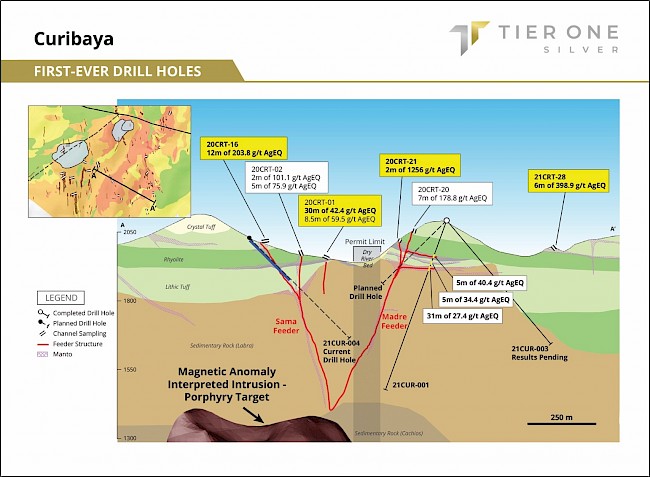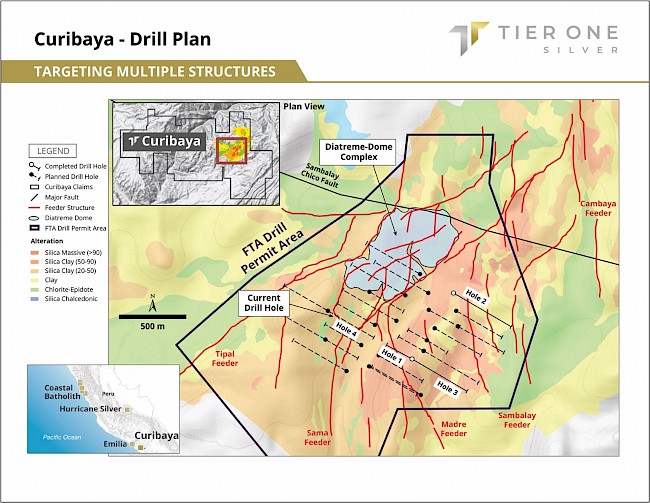TIER ONE SILVER DRILLS MINERALIZED SYSTEM PARALLEL TO FEEDER STRUCTURE IN FIRST DRILL HOLE AT CURIBAYA PROJECT
Vancouver, Canada – September 7, 2021 – Tier One Silver (TSXV: TSLV, OTCQB: TSLVF) (“Tier One” or the “Company”) is pleased to announce results from the first ever drill hole into the Curibaya project in southern Peru. Although the first drill hole did not intersect the feeder structure interpreted from surface information, it encountered broad widths of intense hydrothermal silica clay alteration within three sub-horizontal bodies over a drill width of approximately 70 metres (m) from 131 – 197 m drill depth. Mineralized intercepts from these sub-horizontal bodies include 31 m of 27.4 g/t silver equivalent (AgEq), including 1 m of 125.6 g/t AgEq and 1 m of 77.4 g/t AgEq, 5 m of 40.4 g/t AgEq, including 1 m of 99.7 g/t AgEq, and 5 m of 34.4 g/t AgEq. See Table 1 below for complete results from drill hole 21CUR-001. Importantly, the first drill hole drilled parallel to the interpreted high-grade Madre feeder structure where 2 m of 1,256 g/t AgEq and 7 m of 178 g/t AgEq were channel sampled on surface (Figure 1).
The orientation of the feeder structure was originally interpreted as vertical, however, additional surface mapping and channel sampling results received during the drill program suggest that the feeder structure dips parallel to the orientation of the first drill hole. Subsequently, all planned holes are being adjusted to cross high-grade structures at a perpendicular angle.
A Message from Peter Dembicki, President, CEO and Director:
“The most important outcome from the first-ever hole into the Curibaya project is our targeting breakthrough, which has been further supported by the additional surface data we obtained during the drill program. We are currently drilling the fourth hole, which is crossing multiple feeder structures and has demonstrated the strongest alteration and most intense veining to-date.”
“The Company is well funded, has several drill holes pending and is adjusting permits to better align future drill holes with the new data being received to target beneath the multi-kilogram veins identified on surface.”
Significance of Drill Hole 1:
The sub-horizontal bodies of hydrothermal alteration and associated lower-grade mineralization are interpreted to be caused by lateral fluid flow emanating from sub-vertical feeder structures. Tier One’s technical team is highly encouraged by the strength of the stockwork vein arrays, crackle breccias and sheeted veins observed within the intersected sub-horizontal mineralized bodies and believes that the steeply dipping feeder structures have the potential to carry much higher grades of silver mineralization, as observed on surface through numerous channel samples (Figure 2). In addition, the greatest width of mineralization was encountered at the contact between the Toquepala volcanics and the sedimentary basement sequence, which provides a strong rheological contrast to focus fluid flow.
Drill Plan Moving Forward:
The drill plan is focused on testing five interpreted feeder structures with proven high-grade on surface, along with the margins of the central dome and diatreme complex, which is believed to be the center of volcanic and hydrothermal activity at Curibaya (Figure 3). The Company is modifying its current permit to allow for drilling across the dry riverbed that lies directly between two of the principal targets – the Madre and Sama feeders. In addition, the Company is expanding the drill permit to include the recently identified Cambaya feeder structure. Future drill holes are planned to cross the feeder structures at this favourable horizon, as shown in Figures 1 and 3.
A Message from David Smithson, SVP of Exploration:
“Although we did not drill across the feeder structure in our first hole, we have learned a considerable amount about the system. We have encountered intense stockwork alteration and several key indicator metals beneath the expansive footprint of high-grade, implying the potential of a robust precious metals system and a potential porphyry nearby.”
“We have adjusted our targeting and are focusing on the strong geophysical anomalies, as well as the newly mapped and sampled structures that have demonstrated high-grade on surface. We are very excited by what we’re seeing in the core of our current hole and are looking forward to receiving the pending results.”
Table 1: Drill results from first drill hole into the Curibaya project
| Hole ID | | From
(m) | To
(m) | Length
(m) | AgEQ
(g/t) | Ag
(g/t) | Au
(g/t) | Zn
% | Pb
% |
| 21CUR-001 | | 131 | 136 | 5 | 40.4 | 32.8 | 0.07 | 0.05 | 0.01 |
| Incl. | 131 | 132 | 1 | 99.7 | 90.7 | 0.09 | 0.04 | 0.01 |
| | 155 | 160 | 5 | 34.4 | 8.9 | 0.05 | 0.42 | 0.05 |
| | 166 | 197 | 31 | 27.4 | 15.8 | 0.03 | 0.18 | 0.02 |
| Incl. | 168 | 169 | 1 | 125.6 | 116.0 | 0.05 | 0.11 | 0.02 |
| and | 176 | 177 | 1 | 77.4 | 68.3 | 0.04 | 0.12 | 0.02 |
Main intervals - AgEq (Ag,Au,Zn,Pb) intervals at 25ppm (minimum 5m, max consecutive dilution 6m); Sub-intervals - AgEq (Ag,Au,Zn,Pb) intervals at 75ppm (minimum 1m, max consecutive dilution 2m)
Metal price used for AgEq calculations: Au $1,300/oz, Ag $18/oz, Zn $1.25/lb, Pb $1/lb |

Figure 1: Illustrates the location and results of drill hole 1 from the Curibaya project, which was drilled parallel to the steeply dipping Madre feeder structure. Note that the current drill hole, 21CUR-004 crosses the Sama feeder structures at a high angle. In addition, the next planned hole testing the Madre feeder structure will cross it at a high angle, intersecting it close to the contact between the Toquepala volcanics and sedimentary basement.

Figure 2: Includes core photos from mineralized sub-horizontal bodies from drill hole 1 at Curibaya. Strong hydrothermal silica clay alteration, stockwork vein zones and crackle breccia bodies were intersected, demonstrating the strength of the hydrothermal system.

Figure 3: Illustrates the network of interpreted feeder structures and the central diatreme-dome complex that are being targeted in the current drill program at the Curibaya project.
Michael Henrichsen (Chief Geologist), P.Geo is the QP who assumes responsibility for the technical contents of this press release.
ON BEHALF OF THE BOARD OF DIRECTORS OF TIER ONE SILVER INC.
Peter Dembicki
President, CEO and Director
For further information on Tier One Silver Inc., please contact Natasha Frakes, Vice President of Communications at (778) 729-0600 or info@tieronesilver.com.
About Tier One
Tier One Silver is an exploration company focused on creating value for shareholders and stakeholders through the discovery of world-class silver, gold and base metal deposits in Peru. The Company’s management and technical teams have a strong track record in raising capital, discovery and monetization of exploration success. The Company’s exploration assets in Peru include: Hurricane Silver, Emilia, Coastal Batholith, Corisur and the flagship project, Curibaya, which has commenced its first drill program. For more information, visit www.tieronesilver.com.
Curibaya Drilling:
Analytical samples were taken by sawing HQ or NQ diameter core into equal halves on site and sent one of the halves to ALS Lab in Arequipa, Peru for preparation and then to Lima, Peru for analysis. All samples are assayed using 30 g nominal weight fire assay with atomic absorption finish (Au-AA25) and multi-element four acid digest ICP-AES/ICP-MS method (ME-MS61). Where MS61 results were greater or near 10,000 ppm Cu, 10,000 ppm Pb or 100 ppm Ag the assay were repeated with ore grade four acid digest method (Cu, Pb, Ag-OG62). Where OG62 results were greater or near 1,500 ppm Ag the assay were repeated with 30 g.
QA/QC programs for 2021 core samples using company and lab duplicates, standards and blanks indicate good accuracy and precision in a large majority of standards assayed.
Silver equivalent grades (AgEq) were calculated using silver price of US$18/oz, gold price of US$1,300/oz, zinc price of US$1.25/lb, and lead price of US$1.00/lb. Metallurgical recoveries were not applied to the silver equivalent calculation.
Intercepts were calculated with no less than 5 m of >= 25 g/t AgEq with maximum allowed consecutive dilution of 6 m.
True widths of mineralization are unknown based on current geometric understanding of the mineralized intervals.
Forward Looking Information and General Cautionary Language
This news release contains forward-looking statements and forward-looking information within the meaning of Canadian securities legislation (collectively, “forward-looking statements”) that relate to the Company’s current expectations and views of future events. Any statements that express, or involve discussions as to, expectations, beliefs, plans, objectives, assumptions or future events or performance (often, but not always, through the use of words or phrases such as “will likely result”, “are expected to”, “expects”, “will continue”, “is anticipated”, “anticipates”, “believes”, “estimated”, “intends”, “plans”, “forecast”, “projection”, “strategy”, “objective” and “outlook”) are not historical facts and may be forward-looking statements and may involve estimates, assumptions and uncertainties which could cause actual results or outcomes to differ materially from those expressed in such forward-looking statements. No assurance can be given that these expectations will prove to be correct and such forward-looking statements included in this news release should not be unduly relied upon. These statements speak only as of the date of this news release. In particular and without limitation, this news release contains forward-looking statements regarding the Company’s exploration plans.
Neither the TSX Venture Exchange nor its Regulation Services Provider (as that term is defined in the policies of the TSX Venture Exchange) accepts responsibility for the adequacy or accuracy of this release.